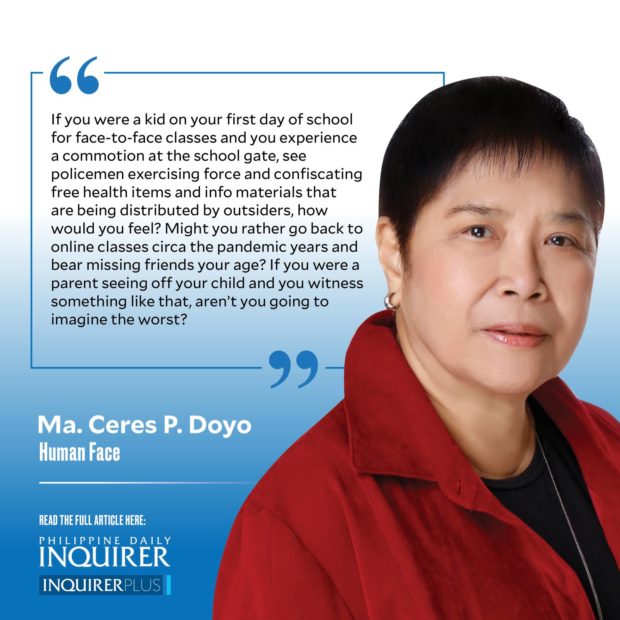Overbearing cops at the school gate
If you were a kid on your first day of school for face-to-face classes and you experience a commotion at the school gate, see policemen exercising force and confiscating free health items and info materials that are being distributed by outsiders, how would you feel? Might you rather go back to online classes circa the pandemic years and bear missing friends your age? If you were a parent seeing off your child and you witness something like that, aren’t you going to imagine the worst?
God forbid that mass shootings like those in the US schools should happen here. Anything that suggests force or violence in what is supposed to be a safe place for children should be avoided by all means. The city streets (rivers and mountains for those in remote places) are dangerous enough, and exposing the schoolchildren to what looks like danger dampens their desire to learn.
On Facebook (via @inquirerdotnet) last Monday, Aug. 22, the first day of face-to-face classes, was a video footage of policemen confiscating face masks, alcohol, and food items being distributed by Salinlahi, a nongovernment organization, and the Children’s Rehabilitation Center to the students of President Corazon Aquino Elementary School in Barangay Batasan Hills in Quezon City. (Just asking: Why was the so-named school chosen?) The FB caption read: “Placards calling for the safe return to in-person classes were also confiscated.”
The commotion that resulted from the police’s strong-arm tactics was in full of view of pupils and parents. In the video clip, a voice could be heard saying: “Pati ba naman ang para sa bata, bakit ninyo kinukuha? Ano ang kasalanan?” (Even those for the kids, you are confiscating? What wrong was committed?)
I went to the Salinlahi (Salinlahi Alliance for Children’s Concerns) Facebook page to find out what it was all about. Salinlahi belied police claims that they caused fear to students and parents when they distributed the health items.
Salinlahi’s statement: “It was a peaceful gathering that aimed to help, not cause chaos or bring fear to children and their parents. We positioned the booth at the side of the school and it was clear that parents and schoolchildren were approaching our booth on their own to get fruits, face masks, and alcohol.” The children’s rights advocacy group said schoolchildren have the right to know the issues affecting them. “Children are intelligent, creative, and have a capacity to understand.”
The dispersal and confiscation were not what a child should experience on the first day at school. Did the police see something provocative? A Salinlahi streamer that looked like a blackboard had the words: “Ligtas na balik-eskwela, ipaglaban.” (Fight for a safe return to school.) If you ask me, ipaglaban (fight) might be a strong and loaded word for a grade schooler. That probably sounded rally-like and the police’s knee-jerk reaction was to use force. Talk about fine-tuning an advocacy call to suit an occasion.
Gabriela, a national alliance of women, condemned the “violent intimidation, harassment, and physical assault perpetrated by the Philippine National Police from Batasan Police Station 6 against” the groups that distributed hygiene kits and food packs…
Said Gabriela secretary-general Clarice Palce: “What the police did was extremely inhumane! Since when did helping children become a crime? The relief distribution was meant to assist kids and parents who were sent back to school today without clear assurances and plans from the national government for ensuring safe school reopening.
“Instead of assisting the distribution, the police chose to scare, physically assault, and then tried to illegally arrest children rights advocates who only intended to provide aid to children.”
Questions: How should school officials deal with activities—especially if unannounced—around their campuses, such as the one organized by Salinlahi? How should advocacy groups, no matter how well-meaning, conduct their activities so that students, parents, and school officials are not unnecessarily alarmed? How should law enforcers and local government officials deal with such activities that may be well-intentioned but which they might find provocative or antigovernment?
The children, think of the children.
—————-
Send feedback to cerespd@gmail.com

















